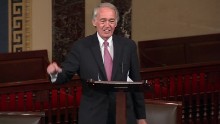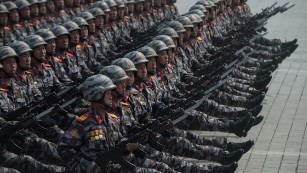US options on North Korea: It's a choice between bad and worse
(CNN)So, it has finally happened.
Two subsequent launches of long-range Hwasong-14 missiles in July demonstrated that North Korea has joined the small club of countries capable of hitting not only Alaska and Hawaii, but also the Lower 48 with a nuclear warhead.
This means it is time to start taking the North Korean problem seriously. The public will demand from the politicians "to do something," but the sad truth is that options are highly limited.
Very few analysts still believe that North Korea will denuclearize in exchange for political and economic concessions from the United States and other interested parties.
Dead people don't need money
North Korea latest
- North Korea fired a second long-range, intercontinental ballistic missile on Friday
- Experts believe if the projectile had been fired on a standard trajectory, it could have threatened cities on US mainland
- US President Donald Trump said Saturday that China, North Korea's most important ally, isn't doing enough to rein in its neighbor.
- The US said Sunday it flew stealth bombers over North Korea in response to the test
- Top US official says "time for talk is over"
North Korean leaders know that dead people do not need money, and they believe that without nuclear weapons they will be as good as dead.
They see themselves as vulnerable to both foreign attack -- the fate of former Iraqi dictator Saddam Hussein -- or killed in a domestic rebellion assisted from overseas -- the fate of former Libyan leader Moammar Gaddafi, the only dictator in history who agreed to abandon his nuclear program in exchange for promised economic benefits.
Economic sanctions, currently the most preferable tactics, are not going to work either. To start with, sanctions seldom work with authoritarian regimes and North Korea is the authoritarian regime par excellence.
Additionally, China, North Korea's only significant trade partner, has serious reasons not to fully join their sanctions because it doesn't want to provoke a domestic crisis in North Korea and deal with its consequences.
North Korea's 2015 imports
Source: Observatory of Economic Complexity
The military options are too risky: any attack against nuclear and military targets in North Korea is likely to provoke a massive counter-strike against Seoul.
This leaves us with only one option -- the long-discussed but usually neglected idea of a "freeze."
Most freeze proposals are usually structured as such: North Korea gets keep all the nuclear weapons and missiles it has produced so far, but must refrain from testing any missiles and nukes. In exchange, Pyongyang gets a pretty generous package of political concessions and financial aid delivered by the United States and other interested parties.
Such a package would have to be really generous because North Korean leaders, contrary to common assumptions, are not under much pressure. The country's economy, in spite of sanctions, is doing remarkably well: according to the most conservative estimates, in 2016 the GDP growth was close to 4%.
Why North Korea still hates the United States: The legacy of the Korean War
Such a deal is of course going to be quite flawed in many regards. First, given the North Korean track record, we can be pretty sure they will be cheating. Second, the North Koreans are likely to walk away from the deal at any moment, if they decide that it doesn't suit their interests any more.
However, policy is seldom a choice between good and bad. More frequently, it is a choice between bad and worse, and in this case all alternatives to the freeze are indeed, worse.
It could get ugly
If no deal is reached, North Korea is likely to further advance its nuclear and missile program, and the results are likely to be really ugly.
To start with, in near future North Korea is likely to develop and deploy a solid-fuel ICBM (the recently tested Hwasong-14 uses liquid fuel).
It takes time, possibly half an hour or more, to prepare a liquid-fuel missile for launch. The US military, with its superior intelligence gathering capabilities and air superiority, can use this time to locate and destroy the missile. A solid-fuel missile can be ready in few minutes, making harder to locate and wipe out.
Another advancement likely to happen relatively soon is the development of the thermonuclear warhead -- a powerful type of nuclear weapon.
It's not clear how precise North Korean missiles are, but that problem would be mitigated if they are equipped with powerful warheads. For example, if Pyongyang were to target New York City's population centers, it wouldn't matter whether the missile hit Manhattan or the waters near Staten Island: a thermonuclear weapon would obliterate the city either way.
Dodging missile defenses
It is also likely that in due time North Korean engineers will perfect technologies which will be able to reduce efficiency of the US anti-missile defenses, like the controversial Terminal High Altitude Area Defense (THAAD) system, which is designed to take out shorter-range ballistic missiles.
Nobody really knows how efficient the existent systems would be in a real battle situation -- THAAD is often described as hitting a bullet with a bullet -- but there is little doubt that the US military will have more trouble intercepting more sophisticated missiles with multiple warheads and decoys.
Last but not least, the sheer increase in number of North Korean missiles and nuclear devices is likely to constitute a problem in itself. It will increase a probability of an incident, and might also make North Korean leadership more prone to over-confident and adventurous actions.
One can argue that North Koreans are likely to advance their technology even if they agree to a freeze. This is true, but the speed of this advance will decrease significantly, since the North Korean scientists and engineers will need a lot of testing. And the freeze agreement, as long as it holds, will deprive them of such opportunities. Thus, in spite of all its imperfections, the freeze agreement is likely to deliver some results.
It will be possible to reduce the probability of North Koreans unilaterally withdrawing from the agreement by structuring its properly. The concessions the US and other interested parties are going to make, no matter how serious, should be completely and easily reversible and clearly conditional on Pyongyang's willingness to honor the freeze agreement. So, if North Koreans resume nuclear and missile testing, they will immediately loose access to the advantages they enjoy under the freeze regime.
The freeze is not a perfect compromise. However, alternatives are worse, so the sooner the new reality will be understood by the decision makers in Washington and elsewhere, the better.
News Courtesy: www.cnn.com












